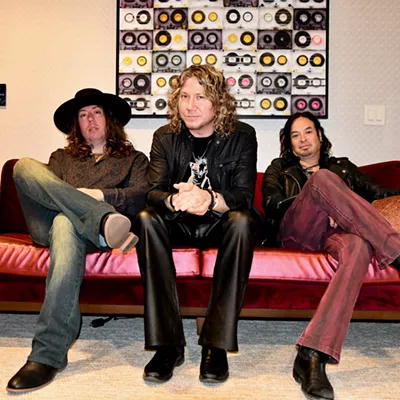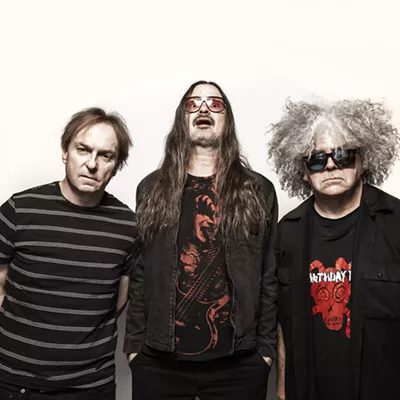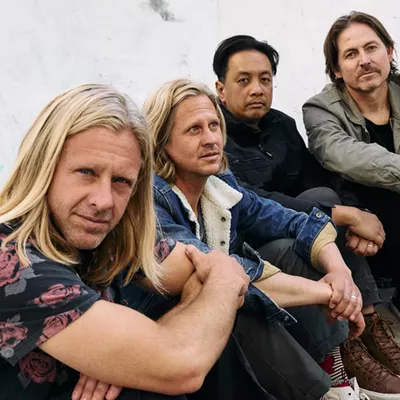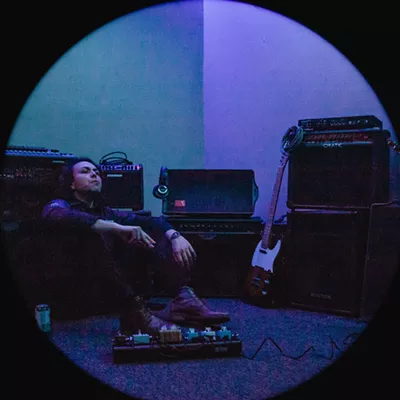Mahlasela's efforts played a large part in influencing a people's movement that eventually resulted in South Africa's new democratic government. Through his activism, he established and maintained close contact with national leadership, performing for President Nelson Mandela's inauguration in 1994.
But he faced a challenge of a different kind--breaking through to the fickle tastes of the American listening public--when he became a professional recording artist about a decade ago.
"The first time I came to the United States was in 1996, and maybe the record company didn't know how to market my music," said Mahlasela earlier this week by phone from his hotel in New York City.
Mahlasela, an accomplished guitarist, percussionist, composer, arranger, band leader and performer, spoke on the eve of another American tour that could play a part in drawing more attention to his music.
He's on the road with fellow African singers Habib Koité, from Mali, and Dobet Gnahoré, from the Ivory Coast. The three artists will perform--together and separately--at the UA's Centennial Hall on Wednesday night, Oct. 25.
The tour promotes the recently released CD Acoustic Africa, for which it is also named. The album is one of those seemingly ubiquitous Putumayo Records compilations designed to provide a brief taste of a specific style of world music.
In addition to one song each by Koité, Mahlasela and Gnahoré, Acoustic Africa features tunes by nine other artists from Senegal, Madagascar, Congo, Cape Verde, Guinea-Bissau and Benin.
Since he began recording in 1991, Mahlasela has been a perennial superstar in his native country, performing material steeped in the themes of the struggle for freedom, and forgiveness and reconciliation with your enemies. But his rich compositions and soulful singing voice went largely unnoticed on these shores for several years.
In the 21st century, Mahlasela has worked, with more success, with ATO Records, the imprint owned and operated by American rock star Dave Matthews, who was born and raised in South Africa. ATO in 2003 released The Voice, a compilation of songs from Mahlasela's previous eight albums.
Mahlasela is working on an album of all-new material for ATO. To be released in February and tentatively titled Guiding Star, it will feature guest appearances by Matthews, Ladysmith Black Mambazo and Jem.
"ATO has done a great job," he said, noting that the label has guided his American tours to taste-making venues such as SOB's in New York and the House of Blues in Los Angeles.
"I have found that the American people like to find things for themselves. You can't say to them, 'Here is Vusi; you have to love him.'
"My approach with ATO has been a very grassroots one. I also go to schools and talk to students who have interests in Africa and African culture and history. And Amandla set up a very nice audience for me as well."
It didn't hurt a bit that Mahlasela appeared in the 2002 Sundance favorite Amandla! A Revolution in Four-Part Harmony, a film about the importance of music and song in South Africa's anti-apartheid struggle. Among the other musicians in the film and on its soundtrack are legends such as Hugh Masekela, Miriam Makeba and Abdullah Ibrahim.
He also was featured on the soundtrack album for the South African movie Tsotsi, which this year won the Academy Award for Best Foreign Language Film.
Born Vusi Sidney Mahlasela Ka Zwane 41 years ago near Pretoria, Mahlasela grew up in Mamelodi township, where he still resides. He never knew his father, lost his mother at a young age and was raised by his maternal grandmother.
In Mamelodi, a hotbed of creativity that has given birth to a variety of poets, writers, artists and musicians, the young Vusi taught himself to play on a homemade guitar, reportedly made from tin cans and fishing line. He was performing in public by the time he was 17, and because of the themes of his music, he found himself in demand at political rallies and cultural events.
He also associated with the Ancestors of Africa, a rambunctious group of poets, musicians and actors formed in 1981.
In an interview at his Web site, Mahlasela recalled, "We were picked up and harassed in all types of situations, going to church every Sunday and being forced to sign a piece of paper at the police station first. If I was going out of town for a wedding, it had to be reported to the police first."
After joining the Congress of South African Writers in 1988, Mahlasela further developed his art and consciousness, having been taken under the wing of South African poet Lesego Rampolokeng. He built up enough confidence to release his first album, When You Come Back, which is regarded as a South African classic.
Anticipating the current tour, Mahlasela spoke symbolically of performing with Koité and Gnahoré, neither of whom he has worked with before.
"To describe it, I have to use a little poetic license. The three of us are a perfect triangle. We are like three mountains on the same continent that have never met before. Through the shadows we cast, though, we have touched each other, and now we are reaching together up to the sunshine."






